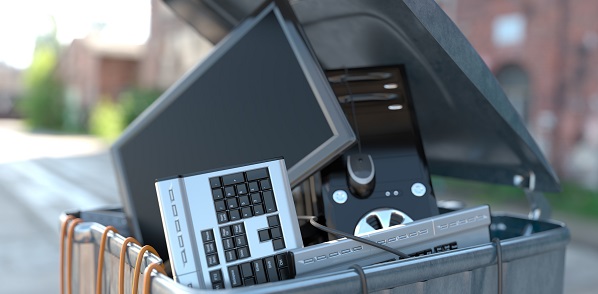
By Robert Jennings June 9, 2015
I dropped my phone the other day. Cracked the screen. And, when I say cracked, I mean I had to clean glass shards out of my face after every phone call. Now, being the tech-savvy individual I am, I could have easily gotten a new screen and done the replacement myself. No big deal.But, I’d had the phone for a little over three years, and it was starting to have problems that a simple factory reset wouldn’t fix. Plus, I’d lost my stylus about a month prior. So, I figured I’d served enough time and could assuage my conscience enough to justify an upgrade. Or maybe I’m selfish. I’ll let you decide.
So now, I’m faced with a dilemma. I have this shiny new phone, and a sharp old phone with very little reuse value and no resale value. It should be an easy problem to solve, right? I should just recycle it. Right? I’ll just stick it in the curbside e-waste bin and be done with it.
It’s, uh, it’s that… easy?
But no, no it isn’t. If it was, everyone would be doing it.
The truth about e-waste recycling
Clearly, everyone is not doing it. Only eight percent of smartphones were recycled in 2009. Computers, in 2010, were recycled at a rate of 40 percent. And that’s the highest number on the chart. When it was all said and done, a whopping 27 percent of all electronics disposed of in 2010 made it into the recycling … cycle.We all know that tossing electronics is terrible for the environment, and some states have passed laws limiting what can be thrown away (here’s lookin’ at you, California). But the Federal Government has yet to get in the game, despite having a whole agency devoted to doing exactly that.
Despite state regulations, and local collectors’ restrictions, over half of our electronics still end up in the landfill. Which means we produce more electronics from scratch, which means we throw more away, ad immunditiam.
Why don’t we recycle electronics?
As cliché as they’ve become in the green movement, Kermit’s words hold especially true in the case of e-waste. We don’t recycle our electronics, because it ain’t easy.When we’re done with our smartwater bottles and our tofu wrappers, we can toss them into the appropriate bin and go about our day feeling like we’ve accomplished something, when all we really did was what we were already planning to do. We just aimed our jump shot for a different can.
When my phone finally keeled over, I couldn’t drop it in the tub next to my desk and trust that it would get to where it needs to be. Unfortunately, if I’m like most Americans, I’m still gonna drop it in the tub (Don’t worry, I won’t. I promise). Because I’m not about to go out of my way for something that I’ll forget as soon as my shiny new Next Big Thing shows up on my doorstep.
It’s not that I don’t care about the environment. It’s that I’ve already forgotten I had an old phone in the first place. Taking it to an e-waste collection point requires the effort of either remembering it’s there when I happen to be going near one, or making a special trip to BestBuy just to recycle my phone.
It’s far easier just to toss it.
I don’t think laziness and forgetfulness are the whole problem, though.
While it is a pretty serious individual problem (and I’ll admit that I’m just as guilty), it’s also a systemic issue. See, there’s this whole multi-billion-dollar industry whose mission it is to take our waste out of sight. They facilitate our forgetfulness, and we pay them well to do it.
Recently, these professional waste erasers have bent to our desires and started collecting recyclables curbside. But they still don’t collect our electronics.
Things are getting better, though. Some towns have begun picking up e-waste by appointment, and New York has recently passed a law that makes it illegal to try to slip electronics in with your regular trash. With that law on the books, it’s only a matter of time before the largest city in America has to accommodate its citizens by picking up their e-waste.
What can we do?
Wrong question. The question is, what can’t we do?We can’t keep ignoring the problem.
We can’t keep tossing our electronics in the garbage.
We can’t keep up our “out of sight, out of mind” attitudes.
What we can do is start putting pressure on the filth ninjas who slink in quietly in the night and abscond with our refuse. We can let them know we want a curbside e-cycling program. And we’ll win, because in this case, we hold the power, because we hold the money. As customers, we can contact our waste disposal experts and tell them, in no uncertain terms, that we want them on board.
Maybe I’m an idealist, but if we keep up the pressure, all it’s gonna take is one company. If they want to stay competitive, the others have no choice but to follow.
Let’s do this! 3… 2… 1…
Break.